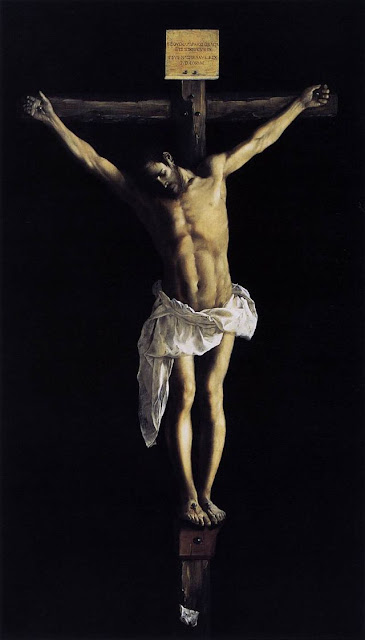
Remembering that His hands were pierced instead of mine.

Bronze represents judgment. Jesus took upon Himself the wrath due to me on the cross. A cross to bless my home came with a great price from God, who sent His Son.

Bronze represents judgment. Jesus took upon Himself the wrath due to me on the cross. A cross to bless my home came with a great price from God, who sent His Son.

Yesterday, we remembered Christ and His crucifixion, His holy sacrifice for our filthiness and sin. Every sin I have
committed, every idle word I have spoken, was nailed to the cross yesterday. There
seems to be a void after the horrific crucifixion scene the previous day and the celebration of an empty grave on Sunday. Sabbath Saturday seemed
quiet; the dust settling from the events and commotion of the traumatic events
of the previous day, and a calm hush appeared to hold the city captive. It
looked like everything was dead. Everything the disciples hoped for is
gone—their dreams died and were buried with Jesus. The perceived injustice broke
their hearts, and indeed, the question had to well in their minds—why did He
have to die?
Many have asked this question through the centuries since He
laid down His life for the world. It was foretold through the Old Testament: “They are striking the judge of Israel on the cheek with a rod. Bethlehem Ephrathah, you are small among the clans of Judah; One will come
from you to be the ruler over Israel for
Me. His origin is from antiquity, from eternity” {Micha 5:1a–2 HCSB}. This
speaks to His eternal nature, the
pre-existent Christ—the Lamb that was slain {Revelation 13:7-9}came in the
flesh. Jesus told His disciples that everything written about Him in the Law,
the Prophets, and the Psalms must be fulfilled {Lk.
24:44}.

“Christ has sinlessly borne the sins of the world. In His innocence, he has submitted first in the full waters of the Jordan and then in the bloody waters of the cross, to baptism for sin’s repentance becoming cursed for us in over us and save us from our sin.” [1]

“Christ has sinlessly borne the sins of the world. In His innocence, he has submitted first in the full waters of the Jordan and then in the bloody waters of the cross, to baptism for sin’s repentance becoming cursed for us in over us and save us from our sin.” [1]
Some argue that this sacrifice is cruel and sadistic, but they are misguided. It was a price motivated by the love and compassion of the only wise God. He could have chosen to leave us in our sins, awaiting judgment, displaying His perfect justice. He could have chosen to save no one. But God, in His love, chose to redeem us instead of leaving us to wallow in the mire.
Because He is holy and sin requires judgment, Christ’s
atonement was necessary. Jesus prayed in the garden to let the cup of His death
pass from Him {Matt. 26:39}, if only there was another
way…but He always prayed according to Father’s will. This is evidence that Jesus couldn't avoid His death and the cup of His suffering if
He was going to fulfill the Father’s purpose and redeem mankind.
“Who has believed our
message? And to whom has the arm of the Lord been revealed? For He
grew up before Him like a tender shoot, And like a root out of
parched ground; He has no stately form or majesty that we should
look upon Him, nor appearance that we should be attracted to Him. He
was despised and forsaken of men, a man of sorrows
and acquainted with grief; And like one from whom men hide their face
He was despised, and we did not esteem Him. Surely our griefs He
Hime, And our sorrows He carried; Yet we ourselves esteemed
Him stricken, smitten of God, and afflicted. But He was pierced
through for our transgressions, He was crushed for our iniquities; The chastening
for our well-being fell upon Him, And by His scourging we are healed. All of us like sheep
have gone astray, each of us has turned to his own way; But the Lord has
caused the iniquity of us all To fall on Him” {Isaiah
53:1-6 NASB}.

But this is not the end of the story. Friday happened, but Sunday is coming! The Suffering Servant is now the victorious King!
“He will divide the spoils with
the strong. This means that we share in Christ’s inheritance. According to Paul, we co-heirs
with Jesus cause we have been adopted into the family. We
are God’s children. ‘Now if we are children, then we are heirs—heirs of God and
co-heirs with Christ, if we indeed share in his sufferings in order that we may
also share in his glory’ {Rom. 8:15}.”[2]
“For God so loved the
world, that He gave His only begotten Son, that whoever believes
in Him shall not perish, but have eternal life” {John
3:16}. But His justice required a way for our sins to be paid for, for He
is a holy God and cannot allow sin to go unanswered. Paul tells us that
was why God sent Christ to be the propitiation {Romans
3:25}, the only perfect
sacrifice to pay for our sins. The love and justice of God were the ultimate
cause of the atonement.
On this Sabbath, Passover, and Easter weekend, reflect on God’s holiness and justice and rest in His
love, which chose to redeem you and make available His promises for your
life. In His holiness, He saw your sin; in His justice,
He provided the sacrifice through Christ; and because He loves you, He
redeemed you.
Saturday is almost over…Sunday is Resurrection!
Don’t forget to subscribe to the blog!


















